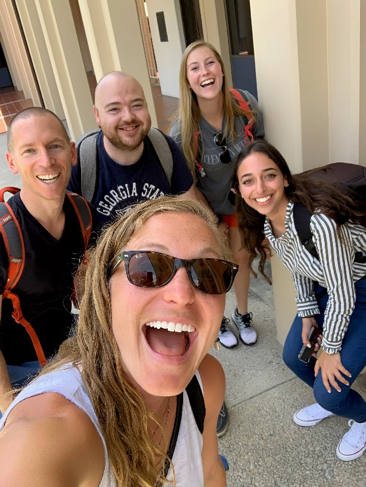Editor’s Note: CSFE helped send Ally Bevers, a senior math and econ major, to the Claremont Graduate University Empirical Workshop held June 10 – 13, 2019. Ally is planning to enter a doctoral program in finance or economics next fall, so she is already putting to work the research skills that she learned at the workshop. Hope you enjoy her short reflection on the experience.
The Claremont Graduate University Empirical Workshop was an amazing experience and I am beyond thankful for the opportunity to attend. It was located in beautiful Claremont, California and the attendees were from all over the country. Well over 200 students applied and I was lucky enough to be one of only three undergraduates who attended. Along with learning about empirical theory and methods, I got to make friends and hear about their graduate school experiences in a crucial time where I am preparing to make decisions about graduate school myself.

Ally Bevers (back center, in gray) poses with other attendees from the Claremont Workshop
The workshop covered a wide variety of topics during the week. We heard from many different professors on the topics of workflow, randomization and randomization inference, causal inference, regression discontinuity, instrumental variables, difference-in-differences, synthetic controls, hidden curriculum, machine learning, and web scraping. If it seems like a lot to fit into a week, trust me, it was! We worked from 9 a.m. – 12 p.m., got an hour’s break for lunch, and worked from 1 p.m. – 5 p.m. Each day was very content-heavy, and we moved quickly through the material. The workshop was designed for 2nd– and 3rd-year graduate students, so there were times I found myself lost because I was not familiar with the content. However, this challenged me to make the best of my situation and take a moment to breathe and reorient myself so I didn’t get frustrated. This experience was important for my personal development, as generally in my undergraduate courses I am on top of the content and don’t tend to get lost. Challenging myself in this way helped me grow as a student and person.
The content I found most useful was workflow, hidden curriculum, and difference-in-differences. I am currently doing the Summer Undergraduate Research Program at Western Carolina University and my research project uses difference-in-differences. Going back through the history, mathematical theory, and code in Stata was extremely beneficial and I took notes to help me with my research. The hidden curriculum was everything we needed to know in order to run productive regressions that we wouldn’t have learned in econometrics. We learned how to avoid mistakes in workflow so we didn’t make major errors in our programming. This can be done by having organized subdirectories, automating the creation of charts and graphs, having a common naming convention, controlling versions of your work, and annotating your code so you will remember what you did and why when you go back and look at them. I was so inspired by the workflow talk we heard that I went through my laptop folders and reorganized and renamed my files in the airport before I came home.
The most interesting content was the coding. I loved learning about machine learning and web scraping in R and I took notes on different resources to look into so that I could learn how to code better. It was so intriguing to see what was possible with just a few lines of code. I got excited about applying the code to real-world examples, and along with the advice I had received from people throughout the week, it helped me become closer to making a decision about my future plans.
Overall, the Claremont Graduate University Empirical Workshop was integral in shaping my decision about the future. It provided me with the insight I needed about what economics PhD programs are like through hearing real experiences of others and seeing the level of content taught in an economics PhD program. I got to receive unbiased third-party opinions from professors whom I hadn’t met before but plan on keeping in contact with. It was truly a wonderful experience and I am so thankful for the opportunity to attend.

